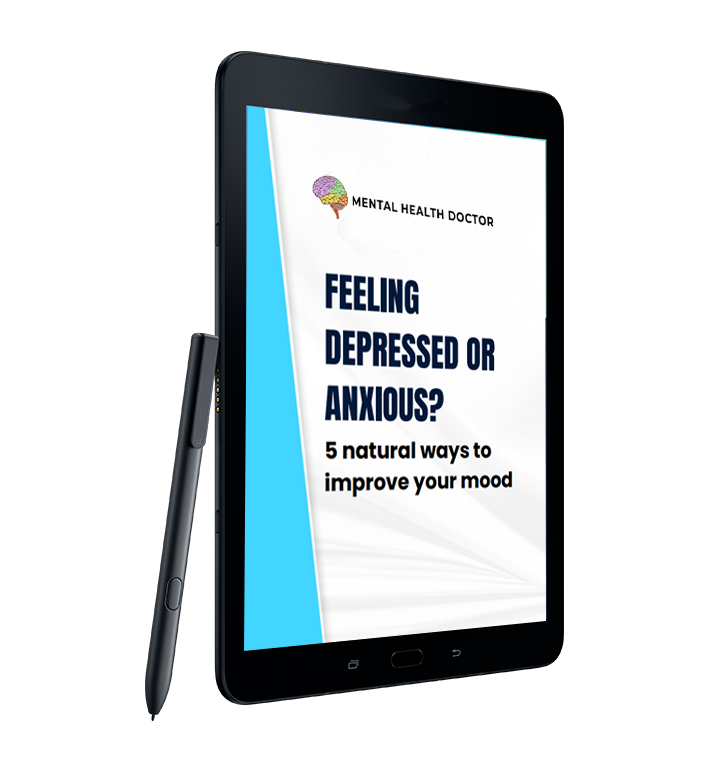Mental Health Doctor
Simplified evidence-based information on mental health and wellness.
SHOCKING Facts On How The Gut-Brain Connection Affects Your Mood!
Learn about the shocking facts on how the gut-brain connection affects your mood in this eye-opening video. Understanding the gut-brain connection is crucial for overall well-being!
Your intestines contain trillions of microorganisms. Not billions. Trillions. So imagine the bustling of a large city like New York, London, Hong Kong, or Lagos at rush hour. That's tiny compared to the bugs you have in your intestines.
These microorganisms are primarily bacteria, but some are fungi, parasites, and viruses. This collection of microorganisms is called the microbiome, which exists throughout your body.
In a healthy person, these bugs live without any problems. In some cases, the microbiome can be altered, leading to dysbiosis. This condition makes you more likely to fall ill and can be caused by several factors.
For the sake of simplicity, let's refer to these microorganisms as gut bacteria since these are the most common bugs. So, what causes your gut bacteria to become altered, leading to dysbiosis?
BREAKTHROUGH on Psychedelics! LSD And Anxiety
Breakthrough Therapy Designation for MM120 was granted after the recent phase two trial showed that one dose of MM120 had a significant reduction in anxiety symptoms.
This study also showed that the improvement in anxiety symptoms was as quick as from the second day of treatment and also lasted for as long as 12 weeks after a single dose!
Just one dose! Impressive. Phenomenal, actually, when you consider that medications like SSRIs take 4-6 weeks to work.
The study also showed that MM120 was generally well-tolerated and mostly presented with the expected side effects of such a drug. Also, compared with experiences with forms of LSD purchased illegally on the street, the study's grade of MM120 did not appear to induce "bad trips."
Now, Breakthrough Therapy Designation by the FDA is a process designed to speed up the development of new medications for serious conditions. Especially when there is evidence that the medication shows a significant advantage over existing treatments. In this case, they fast-track the process to make the medication available to the public quicker.
This study is also fascinating because all the people involved had just MM120. The researchers stopped their previous antianxiety and antidepressant medications. They also did not have psychotherapy during the study. This means that MM120 was responsible for treating their anxiety symptoms. And just a single dose! Truly fascinating!
Two other psychedelics that have received Breakthrough Therapy Designation are MDMA for PTSD and Psilocybin for depression.
So, what is LSD? LSD Stands for Lysergic Acid Diethylamide. It is a synthetic drug that has been abused since the 1960s because of its hallucinogenic properties. LSD causes dissociation and can alter the user's sense of self and time.
Effect of COFFEE on Your Mental Health #coffee #caffeine
In this video, we dive into the effects of coffee on mental health. Learn about the impact of caffeine and how it can affect your brain and mood. #coffee #caffeine
SURPRISING Facts about COFFEE And Your Mental Health!
Coffee contains caffeine - the most widely used drug in the world! In the United States, about 80-90% of adults consume caffeine regularly. But how does caffeine affect your mental health?
The half-life of caffeine is about 3-7 hours. This means it can take your body up to 7 hours to break down caffeine by 50%—by half. Of course, this would be affected by factors like your age, weight, metabolism, liver function, and genetics.
So, if you drink a cup of coffee at 8 a.m., you could still have half the amount of caffeine in your body by 3 p.m.! By bedtime, you could still have some caffeine in your system, although for most people, the caffeine is mostly gone by nighttime.
Coffee can affect sleep because it affects adenosine, a brain chemical that helps with sleepiness and relaxation. When the brain is active, it uses a lot of Adenosine Triphosphate (ATP), which is the primary energy currency of cells.
As your brain uses ATP, it leaves behind a byproduct called adenosine. The longer your brain remains active, the more adenosine builds up. Adenosine binds to adenosine receptors, and more binding occurs over time. During the day, this process slowly reduces alertness and increases drowsiness until you eventually fall asleep at night.
As you sleep, your brain clears out the adenosine so that you wake up feeling rested and alert.
So, here is what happens when you drink coffee. Because caffeine has a similar structure to adenosine, it binds to these receptors and prevents adenosine from binding.
Caffeine, however, does not send a sleepy signal - that's the difference. This means caffeine essentially "turns off" adenosine receptors, so they cannot tell your brain it needs rest. This is why you don't feel sleepy when you drink coffee.
How Ozempic Affects Your Mental Health
Discover how Ozempic, a medication initially approved for type 2 diabetes, can impact your mental health. Learn about the potential side effects and why it's crucial to monitor your well-being while using this drug. Subscribe for more insightful videos on health and wellness!
OZEMPIC: What It Does To Your Mental Health
Learn about the potential effects of Ozempic on your mental health in this informative video. If you're considering this medication, it's important to be aware of its impact.
Can PSILOCYBIN Magic Mushrooms Treat Depression and Anxiety?
In this video, we explore the potential benefits of psilocybin magic mushrooms for treating depression and anxiety. Find out more about the effects of this natural psychedelic compound and its impact on mental health.
The MISUNDERSTOOD World of Borderline Personality Disorder TREATMENT!
We know that borderline personality disorder involves a rigid and unhealthy pattern of thinking and behaving, but what if you could get to the point where you felt in better control of yourself. Your mood improved, and you stopped self-harming and sabotaging your relationships.
So, let's talk about how to treat borderline personality disorder. I'll talk about 3 ways to treat this condition.
The Truth about Borderline Personality Disorder
There are different types of personality disorders, and borderline personality disorder is one of the most common types.
So, what is Borderline personality disorder? Well, this is a mental illness that usually begins in your late teenage years. Some studies show that it is more common in females than males.
But what causes borderline personality disorder? Well, no one knows precisely, but it is thought that genetics and environment are the 2 most significant factors that contribute to this condition. This means you may be prone to this condition because of the genes passed down through your family.
Environmental factors that have been identified as contributing to the development of borderline personality disorder include childhood maltreatment, such as neglect and physical or sexual abuse. Childhood maltreatment is found in up to 70% of people with borderline personality disorders.
Other factors that can contribute to borderline personality disorder are poor attachment to your mother as a child, early separation from your mother, inappropriate family boundaries, and parents struggling with mental illness or drug abuse.
You may struggle to control your emotions if you have borderline personality disorder. This means you may present with intense mood swings, anger, and irritability. It may also cause you to take unnecessary risks. These could affect your ability to function at work, school, or maintain relationships.
If you have borderline personality disorder, you are more likely to have other mental disorders like depression, anxiety, and bipolar disorder. Eating disorders, ADHD, somatoform disorders, and drug and alcohol problems are also common.
About
Hey! Thanks for visiting my website. My name is Dr Efosa Airuehia. Most people refer to me as Dr. Air.
I am a practicing psychiatrist in the state of Texas. In addition to providing patient care, I offer simplified, evidence-based mental health and wellness information.
I am a quadruple Board-Certified physician with certifications in Adult Psychiatry, Child/Adolescent Psychiatry, Addiction Medicine, & Lifestyle Medicine.
This website focuses on how you can improve your mental health using simple, natural lifestyle tenets like nutrition, exercise, sleep hygiene, stress management, social connectedness, and avoiding risky substances. We discuss this as it relates to several mental disorders like depression, anxiety, bipolar disorder, PTSD, ADHD, OCD, psychosis, personality disorders, and autism.
Disclaimer: The content presented on this website does not establish a physician-patient relationship. It is for educational purposes only and not intended to be medical advice from me. Please see your doctor if you have any mental disorders. Call 911 or go to the nearest ER if you have thoughts of hurting yourself or others.
Get Our Free Resource
Feeling Depressed Or Anxious? 5 Natural Ways To Improve Your Mood

Suicide and Crisis Lifeline
Work With Dr Air
Subscribe to Our Newsletter
Subscribe to Youtube Channel


